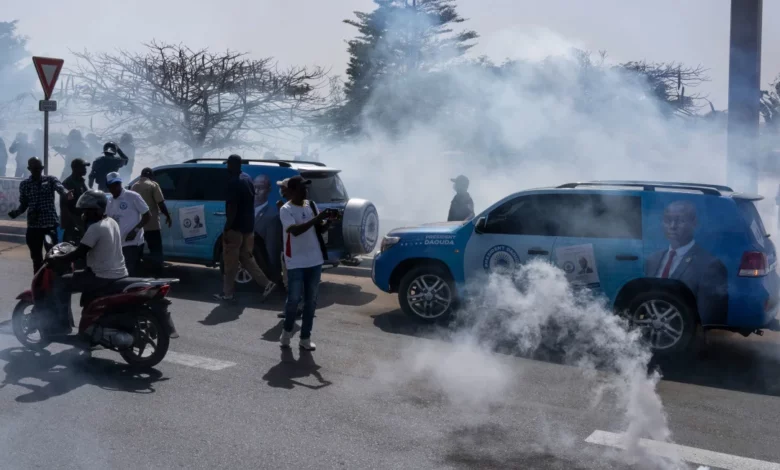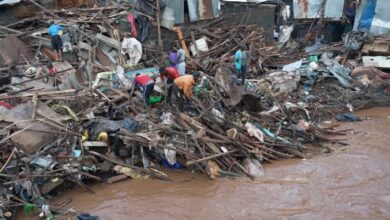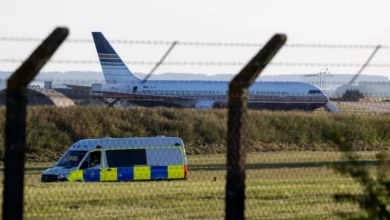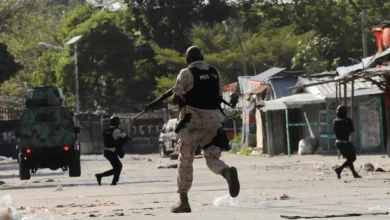
CNN —In a region plagued by volatility, Senegal had long been praised for its political stability.
But the West African country now finds itself at a dangerous crossroads with tensions escalating after its outgoing President Macky Sall postponed the upcoming general election just three weeks ahead of its scheduled date.
News of the election delay, which came as official campaigning for the February 25 vote was due to start, sparked widespread anger in the country with angry youths burning tires in the streets in protest.
Sall, whose second and final term runs out in April, announced Saturday that the vote would not be held as planned, citing disputes over a final list of presidential candidates that excluded dozens of opposition aspirants.
That has angered opponents, who see the move as a bid by Sall to extend his tenure and raised fears of a repeat of the deadly protests last year that were sparked by rumors he intended to run again for office.
Experts say the latest unexpected turn of events has not only put in doubt Senegal’s role as a regional anchor, but also raises concerns about the potential ripple effects in other parts of West Africa, which has seen numerous military takeovers in recent years.
Protesters gesture after police fired teargas at them outside the General Assembly in Plateau, Dakar on February 5, 2024.
Related article Senegal faces political crisis as President Macky Sall delays polls
Senegal remains an outlier as the sole mainland West African country never to have experienced a military coup.
Dakar-based analyst Oluwole Ojewale of the Institute of Security Studies told CNN that while a military putsch is highly unlikely in Senegal, the events of recent days were tantamount to an unlawful seizure of power.
“Amending the law at the eve of an election and allowing the incumbent to stay in power past when his tenure is supposed to end is a constitutional coup,” Ojewale said.
He added that the situation in Senegal would be watched very closely by France, the country’s former colonial ruler, with which it maintains very close ties.
“The conversations going on in France right now will be to quickly find a solution to this self-inflicted dilemma. Nobody wants democracy in Senegal to degenerate,” Ojewale said.
“Senegal is the most enduring democracy in West Africa. It is a poster boy for France and they will not want any instability that will disrupt their interests there.”
Clashes in Dakar
Heightened tensions in Senegal since the announcement have put the capital Dakar on high alert after protests erupted on Sunday and Monday.
The Ministry of Communications and Telecommunications has shut down mobile internet services, citing the need to stop “the spreading of several hateful and subversive messages on social media in a context of threats of disturbances to public order.”
Clashes between police and protesters have seen riot police use tear gas to disperse crowds. Schools and businesses are shut in parts of the country.
The government has also withdrawn indefinitely the broadcasting license of private television channel Walf TV, the network said, adding that its “screens suddenly went black” on Sunday as its guests analyzed the arrest of opposition members during the weekend protests.
Amnesty International described the internet cuts and suspension of Walf’s broadcasting as a “blatant assault on the right to freedom of expression and press rights.”
It called on Senegalese authorities “to respect and protect the right to peaceful assembly and refrain from resorting to excessive use of force” during protests, urging them to “ensure that demonstrators and political opposition figures are not arbitrarily arrested at demonstrations.”
Dakar-based journalist Amadou Barry told CNN Tuesday that fresh protests could happen at any time.
“Due to internet access restrictions, it is not easy to mobilize but at any moment there can be demonstrations,” he said.
Democracy in balance
President Sall’s decision to postpone the elections stems from disputes over the final list of presidential candidates, which notably excluded several opposition aspirants.
The exclusion of popular and prominent figures like Ousmane Sonko and Karim Wade has sparked allegations of unfairness.
Sall, who has previously denied rumors that he planned to run again for office, said he planned to have a national discussion to set clear and fair rules for the upcoming election.
He expressed concerns over how the candidate list was compiled and said he postponed the vote to allow an inquiry into how the candidates were approved.
The candidate list, released last month by the country’s Constitutional Council, which oversees elections, had included incumbent Prime Minister Amadou Ba, who was handpicked by Sall as his potential successor, as well as former Prime Minister Idrissa Seck.
President Macky Sall’s silence on whether or not he would seek a third term ignited an already tense political climate.
Related article ‘A victory for Senegalese people,’ opposition leader says as President Macky Sall rules out third term bid
However, it excluded Sonko, who enjoys widespread support among Senegalese youth, and Wade, son of former President Abdoulaye Wade.
Wade, who was disqualified by the council for holding dual citizenship, had complained he was unfairly excluded saying he had renounced his French citizenship in October last year.
He and his party are among those calling for a delay in the polls to allow for an investigation that will restore his candidacy.
Sonko’s opposition PASTEF Party, however, criticized the postponement of the election, describing it as “a serious threat” to Senegal’s democracy. Sonko was barred from the polls after the Senegalese Supreme Court upheld his conviction over a defamation case.
Furious opposition
Opposition figures, including presidential candidate Malick Gackou, have vowed to challenge the voting delay “by all means,” and have mounted a legal challenge amid a widening rift within the country’s political landscape.
Amnesty International reported that two opposition figures, Aminata Touré and Anta Babacar Ngom, were arrested by the police at a protest.
PASTEF’s Yassine Fall said Senegal’s democratic process had hit a nadir after its parliament approved the delay to the election.
“Very sad day for Senegal’s democracy, which reached rock bottom last night with the use of force to get a parliamentary vote canceling the election process,” Fall said in a post on X Tuesday.
Senegal’s parliament on Monday voted to delay the presidential election until December 15, according to state media RTS.
Several opposition lawmakers were unable to take part in the vote Monday after being forcibly removed from the legislative chamber during the debate, according to state media reports and footage of the session.
Sall will remain in office until his successor is installed.
International response
Senegal’s domestic and international partners are closely monitoring the situation.
The Commission of the Economic Community of West African States (ECOWAS) said Tuesday in a statement it was following “with concern” the “unfolding events” in Senegal and “will take all necessary steps” to support the country in their efforts to sustain democracy.”
France said it was “following the situation in Senegal very closely.”
“We call on the authorities to remove the uncertainties regarding the electoral timetable so that the election can be held as soon as possible and in compliance with the rules of Senegalese democracy,” a statement from the French Foreign Ministry said.
The United Nations urged stakeholders to “speedily resolve differences through consensus and especially in line with Senegal’s longstanding tradition of democratic governance.”
It also urged all parties to “uphold a peaceful environment and refrain from violence and any action that can undermine the democratic process and stability in Senegal.”
With elections pushed back to the end of the year, Senegal faces an uncertain future marked by political uncertainty and potential social unrest.
Ojewale says unless he backpedals, Sall is likely to have a fight on his hands because of the “resilience of the Senegalese people to sustain political protests and their democracy.”
“The people are going to rise up and resist any form of tenure elongation,” he said.




